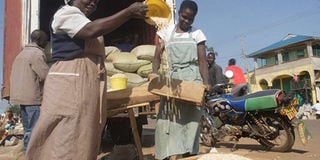For food security, we must create conditions to nourish agriculture

Traders sift their maize ready for sale at a marketplace. Food production needs to grow and diversify to meet the needs of an increasing, and increasingly affluent urban population, while protecting nature. FILE PHOTO | NMG
What you need to know:
- The fact that some countries have progressed further than others creates an important opportunity for them to learn from each other about the opportunities and risks associated with the transformations.
- Finding a way to accelerate and sustain productivity and profitability of smallholder farmers at scale throughout the value chain, while protecting the natural resource base is a key challenge that agriculture and food systems in Sub-Saharan Africa need to address.
- The findings of this exercise attest to the fact that continuing business-as-usual is out of the question. Public investments, while more necessary than ever, will not be enough.
- A high-level and society-wide policy dialogue will also contribute to allowing all actors, including the most vulnerable, with the opportunity to have their say.
Agriculture is the backbone and lifeline of most economies in Sub-Saharan Africa. It has a huge potential not only to increase food availability and contribute to reducing food insecurity and malnutrition, but also to create jobs, raise incomes and enable countries in the region to increase their economic development and prosperity.
Yet, unlocking this potential requires major transformation in the way agriculture and food systems work.
The fact that some countries have progressed further than others creates an important opportunity for them to learn from each other about the opportunities and risks associated with the transformations.
A review of experiences from countries in Sub-Saharan Africa and other parts of the world shows that the transformations that agriculture and food systems have undergone in the last 70 years have trade-offs.
While they’ve reduced undernourishment, on the other hand, they are associated with an increase in overweight and obesity, loss in biodiversity and depletion of fundamental natural resources such as soils, forests and water.
On top of this, sub-Saharan African countries face the additional challenges of feeding an increasing population, ensuring that the growing number of youth have access to remunerative employment, coping with growing urbanisation, and adapting to the impacts of climate change.
To eradicate all forms of malnutrition, it’s not enough to produce calories. Everybody, especially the most vulnerable, should be able to access sufficiently diverse, nutritious and safe foods. Hence, food production needs to grow and diversify to meet the needs of an increasing, and increasingly affluent urban population, while protecting nature.
Finding a way to accelerate and sustain productivity and profitability of smallholder farmers at scale throughout the value chain, while protecting the natural resource base is a key challenge that agriculture and food systems in Sub-Saharan Africa need to address.
This will probably imply less labour-intensive production systems, which will lead to a need for creating more off-farm jobs.
MOVING FOWARD
The second important challenge is how to make a smooth transition to off-farm employment among smallholder farmers, who are unable to achieve the required growth in productivity needed to continue farming.
The FIRST Programme, a strategic partnership between the Food and Agriculture Organization (FAO) of the United Nations, the European Union (EU), and governments of 11 African countries plus the ECOWAS Commission (and countries in Asia, Near East and Latin America), has worked on a stocktaking exercise to identify key bottlenecks and challenges that have hampered progress towards ending hunger and all forms of malnutrition.
The findings of this exercise attest to the fact that continuing business-as-usual is out of the question. Public investments, while more necessary than ever, will not be enough.
Through their policies and institutions, governments will need to create the conditions to ensure that the private sector — the engine of growth — contributes to ensuring that the transformations in agriculture and food systems have positive impacts on nutrition, employment generation, prosperity and environmental sustainability.
While paving the way for private agents (both smallholders, small and medium enterprises and big corporations) to transform agriculture and food systems towards these desired outcomes and engaging with them effectively, governments have to take bold actions for the social transformations that are essential for success.
A high-level and society-wide policy dialogue will also contribute to allowing all actors, including the most vulnerable, with the opportunity to have their say.
Moving forward, there’s an opportunity for broader and deeper learning from experiences within the region and beyond, through schemes such as South-South and Triangular co-operation.
A regional workshop FAO organised in Addis Ababa, Ethiopia, recently provided a chance for sub-Saharan African governments, the private sector and development partners to reflect and learn about innovative solutions in the South.
These are key to tackling food insecurity, poverty and sustainable agriculture issues, accelerating our path to Zero Hunger, and ensuring every person is well-fed and healthy, and that future generations can enjoy sustainable economic growth and development while preserving the region’s precious natural resources.
By Brave Ndisale, Shengyao Tang, and Karel Callens. The writers work for FAO.




